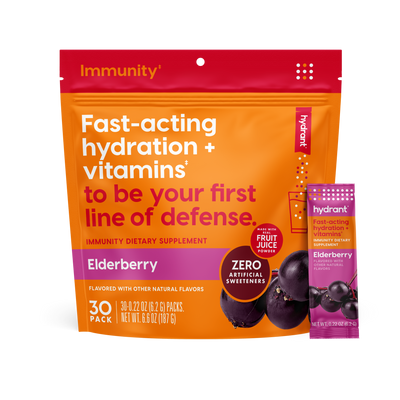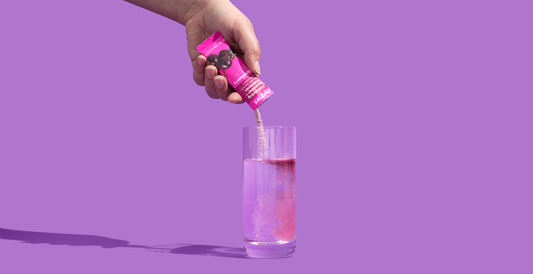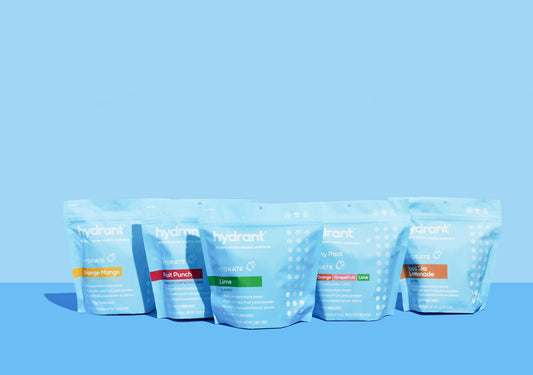Why is Hydration Important?
Doctors, nutritionists, and moms everywhere agree that you should drink six to eight glasses of water a day to stay healthy and hydrated [1]. Usually, this does the job and keeps our fluid levels in check. However, when our bodies are put under pressure by intense exercise or illness, we lose more than water. We also lose electrolytes, which play a critical role in staying healthy. For those with active lifestyles, proper hydration takes more than just water.
What is an electrolyte?
Electrolytes are chemicals that carry an electric charge. Because of the charge, electrolytes are sometimes referred to as ions. For example, when calcium is dissolved in water, it carries a positive charge. This calcium cation is an electrolyte [2]. Your body needs these electrolytes and electric charge to survive.
Sodium, potassium, calcium, magnesium, and chloride are some of the electrolytes most essential to the function of the human body [3]. These electrolytes (along with other natural molecules) are dissolved in water to make up the fluids of the body. But what exactly are body fluids?
Body Fluids
Our bodies are roughly 60% water [1]. This water is split between two areas: intracellular fluid, which is within cells, and extracellular fluid, which is outside cells. Extracellular fluid includes the watery component of blood, known as plasma [4].
Each of these fluid compartments has a different concentration of the key electrolytes. For example, there is almost 40 times as much potassium in the intracellular fluid than there is in the extracellular fluid [4].
The Role of Electrolytes
Electrolytes, and their concentration relative to one another, play several key roles.
Most importantly, the concentration of electrolytes controls how acidic your blood is and dictates how much water is in your body. Any difference in the concentration of electrolytes between intracellular and extracellular fluids guides the flow of water, nutrients, and waste in and out of your cells. That means the type, concentration, and location of electrolytes in your body dictates the flow of water within and out of your body.

The movement of electrolytes is equally important to the movement of water. Your cells have mechanisms to move electrolytes in and out of your cells to change the properties of each cell and its surroundings. For example, if a muscle needs to contract, every cell in the muscle needs to shorten. For the cells to shorten, electrolyte concentrations in the cell need to change.
Regulation of nerves and muscles is also an essential role of electrolytes. Because your brain is a network of nerves, all the processes it performs, such as temperature control, coordination, and alertness (just to name a few!) are dependent on your balanced electrolytes [3].
Individual electrolytes have specific purposes within normal body function:
- Calcium and phosphate are essential components of bone. [5]
- Magnesium is involved in many of the chemical reactions that process food and energy. [6]
- Sodium regulates the amount of water in your body, so it’s particularly important when thinking about hydration, blood pressure and blood volume. [7]
Hydrant contains sugar, sodium, magnesium, potassium and zinc.
Why is it so important to hydrate with more than water?
Your kidneys are constantly working to prevent electrolytes from being lost in your urine, so that they can be recycled and keep the electrolyte concentration of your body fluids normal. However, if you vomit, sweat excessively, or have diarrhoea, you lose huge volumes of fluid at once, and with it, key electrolytes.
There are certain symptoms you can feel if you have an electrolyte imbalance. These include:
- Weakness
- Twitching
- Seizures
- Hearth rhythm disturbances
So, it is very important to keep your electrolyte balance in check to stay healthy!

If you just drink water when you’re dehydrated, and don’t replace the electrolytes, it’s like adding extra water to a cup of coffee—it will just get weaker and weaker, and there won’t be enough electrolytes in your body fluids to maintain proper function. In order to keep our intracellular and extracellular fluids at the right ‘strength’ you have to add electrolytes as well as water.
What has electrolytes
Electrolytes (sometimes misspelled as ‘electolites’) can be found in certain foods. These include fish (calcium), fruit (bananas), nuts and seeds like almonds, cashews and watermelon seeds) and spinach (which contains potassium, calcium and magnesium). You will have to eat a lot of these foods when you’re recovering from dehydration.
One great way we can make sure we hydrate faster than just water and food is Hydrant. As mentioned, electrolytes are available in our daily food and drink, but the quickest way to properly hydrate is to take direct action and use something correctly formulated to give your body what it needs, in the appropriate proportions, as rapidly as possible.
Writer: Ailsa McKinlay
Editor: Elizabeth Trelstad, www.hellobeaker.com
References
[1] Healthy Hydration Guide. British Nutrition Foundation. 2018. The British Nutrition Foundation, a reputable organization, offers a great summary on the role of water in the body and the importance of staying hydrated.
[2] What is the Difference Between an Ion & an Electrolyte? Michael Judge. Sciencing. 25 April 2017. - This website explains scientific terms, such as “ion” and “electrolyte,” in a way that is easier to understand.
[3] Fluid and Electrolyte Balance. Medline Plus. U.S. National Library of Medicine. 17 April 2018. This article summarizes fluid and electrolyte balance. Medline Plus is a part of the U.S. National Institutes of health, so we have good confidence in the reliability of this article.
[4] Body Fluid Compartments. Pete Smith. The University of Liverpool. 1998. The University of Liverpool published this description of the fluid compartments of the body to help explain why electrolytes are important, and to discuss the amounts of electrolytes typically present in body fluids.
[5] Bone Structure and Function. The University of Washington - ASBMR Bone Curriculum. Jane Lian, Jeffrey Gorski and Susan Ott. 2004.The University of Washington describes bone and it’ components in this fact-file. Medline Plus is a part of the U.S. National Institutes of health, so we have good confidence in the reliability of this article.
[6] Magnesium - Fact Sheet for Health Professionals. US Department of Health and Human Services. The article explores magnesium, it’s role in the body, and the best ways to make sure you have enough. Although it is written for health professionals, it is easy to understand.
[7] Electrolytes. MedicineNet.com. Melissa Conrad Stöppler, MD. Reviewed 6/7/2018. This article talks about the roles of individual electrolytes.
[8]. Best Electrolyte Powders is a website with a just-the-facts comparison between the five big electrolyte powder brands
















